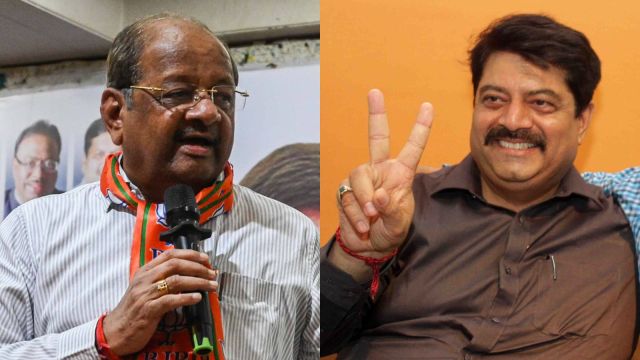From BMC to Lok Sabha: Ex-corporators say knowledge of local issues was key to solve them as MPs
Three of the sitting MPs in Mumbai were former BMC corporators.
 Sitting MPs in Mumbai Gopal Shetty and Manoj Kotak are among those who had served as corporators. (Express photos)
Sitting MPs in Mumbai Gopal Shetty and Manoj Kotak are among those who had served as corporators. (Express photos)Mumbai has had a history of sending representatives to the Lok Sabha who have initially cut their teeth as corporators in the rough and tumble of politics.
Currently, three out of the six sitting MPs in Mumbai — Gopal Shetty, Manoj Kotak and Rahul Shewale — are erstwhile corporators in the Brihanmumbai Municipal Corporation (BMC). While Shetty and Shewale have been sitting MPs from their constituencies since 2014, Kotak was fielded in 2019.
For the upcoming 2024 general elections, Shiv Sena has fielded Shewale for the third time from Mumbai South Central.
While Shetty and Kotak have missed the bus this time, there are indications that another lot of former corporators including Ashish Shelar or Ameet Satam may get nominated to contest the Lok Sabha elections.
Political observers say that fielding someone who has cut his political teeth as a corporator gives the a little bit of advantage due to the feel that the candidate is aware of the ground realities of a particular area.
Sanjay Patil, a political researcher from Mumbai University, told The Indian Express that the fact that political parties like Shiv Sena and BJP have been dominant in the BMC for more than two decades has played a crucial role in creating local level vote banks, helping the parties to intensify its popularity among the voters.
“Both Sena and BJP have made their own strongholds across clusters in Mumbai especially due to their widespread organisational network that spreads throughout the city and suburbs. Candidates like Gopal Shetty or Rahul Shewale were prominent faces when they were corporators and being grassroot level workers, it becomes easier for them to become a popular household face. As a result, political parties prefer fielding these kinds of candidates, knowing that their chances of winning are also high,” Patil told Express.
Shewale told The Indian Express that at a time when there are no elected municipal corporators in Mumbai for the last two years, it has become the MPs’ job to address issues pertaining to local civic administration as well.
“In a city like Mumbai, there is a crisis of coordination between the local and central agencies. For example, to implement the Development Plan 2034 model of the BMC, a large proportion of land acquisition is required and many of these lands belong to the Union ministry. Since I was a corporator, I have a fair understanding about the DP 2034 model and it became easier for me to bridge the gap between the state and Centre. On the contrary, when a candidate becomes an MP directly it takes him/her some time to understand the actual issues on ground,” Shewale said.
Before becoming an MP, Shewale was a municipal corporator from 2002 till 2014. Between 2010 and 2014, Shewale held the position of chairperson in BMC’s standing committee.
Shetty, who was a BJP corporator in the municipal corporation between 1992 and 2004, before he became an MP in 2014, said that for any candidate who has been a corporator before an MP or MLA, it becomes easier to become a household name even before being elected.
“The Mumbai-North seat was earlier helmed by the Congress for ten years, and the fact that I was able to retain it was possibly because I had been a corporator for more than a decade, and have a fair understanding about hyper-local issues like sewage leakage, drain overflow, that trouble the citizens at the booth level. It became easier for us to identify these issues and solve them relentlessly, thus gaining our prominence,” Shetty said.
Kotak, who was a corporator for 15 years between 2007 and 2022, said that as a corporator, a candidate identifies the local issues, while being an MP, he tries to solve it at the highest level.
Kotak became an MP in 2019 and for three years, he managed the portfolio of a corporator as well as a parliamentarian.
“Mumbai is a large city that has varied socio-economic demography. When you are a corporator you identify issues that require intervention at the highest level and then when you become an MP, the knowledge you gained as corporator help you towards framing the policies,” Kotak said.
Surendra Jondhale, a city-based political analyst, however said that the administrative portfolio of any candidate has little to do since almost all the political parties select their candidates also by assessing the ethnic and social composition of a constituency.
“Be it the BJP, Sena or Congress, all the major political parties field their candidates only after assessing the ethnic and social composition of a constituency since the elected public representative is supposed to reflect the nature of constituency that he/she represents,” Jondhale told The Indian Express.







